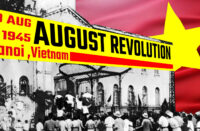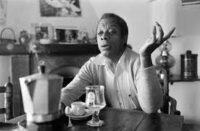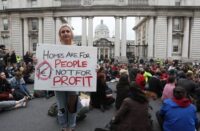Spy thrillers about and accounts of East-West spying during the cold war abound, are always written from a particular Western political standpoint. Autobiographies relating the stories of former “agents for peace” on the other hand are rare. Beatrice Altman-Schevitz’ The Shadow in the Shadow is the only such memoir to be published in English from a woman’s point of view, giving the perspective of a GDR spy.
Beatrice’ newly published autobiography tells the extraordinary life-story of two left-wing US-Americans. Jeffrey, a graduate of the elite Princeton University, was an activist in the free speech movement and very active in the anti-Vietnam War movement. Beatrice’ political awakening occurred in Buffalo and the Attica Prison uprising in 1971 and the court case that followed it. “The injustice was too much for me to remain silent.”
In 1976, Jeffrey was offered a two-year teaching post at the John F. Kennedy Institute for North American Studies at the Free University of West Berlin and so they moved there from the US. Soon they decided to find out more about what life looked like beyond the Wall. As Beatrice explains:
“From 1946 to 1990, the CIA was never going to allow this (socialist) experiment to succeed and did so much to destroy it wherever people attempted to build socialism. So I was more than just curious in 1977. I wanted to be part of this experiment and support it.”
Following meetings with ex-patriot contacts living in East Berlin, they were recruited into the GDR’s Intelligence Agency. From 1977 until 1989, Beatrice and Jeff acquired and passed on sensitive information. Jeff found prestigious jobs at the German Council on Foreign Relations in Bonn and at the Karlsruhe Nuclear Research Centre, where he was able to establish sources who had access to material of interest in Bonn and other industrial locations.
Of key interest to the GDR was the Western government’s position on nuclear energy, high-tech sanctions against the GDR, rearmament and the Nuclear Non-Proliferation Treaty. Also vital was, who were the supporters and who the opponents of NATO’s 1979 decision to station Cruise and Pershing II nuclear missiles in Germany. A second source, from the Green Party, provided inside knowledge regarding the influence of the then young opposition party on security and peace policy. In relation to this work, the author told me:
“Our task was to describe all the different shades of opinion in the Chancellor’s office and various ministries in Bonn, to write up all the diverse positions in the Bonn government between 1980 and 1990: security issues, the non-proliferation of nuclear fuel and weapons.”
Beatrice herself was not only tasked with photographing documents, decoding radio information and acting as courier – she sought positions in workplaces that would also yield useful insights for the GDR: in the South African embassy in Bonn and later working as a social worker in a Karlsruhe US military base. The author writes informatively about both jobs and reveals the close ties the West German government had with the apartheid regime, as well as giving readers an insight into the daily lives and problems confronting the families of US-GIs, including literacy issues and domestic violence.
Beatrice writes this story from her perspective as a woman. She tells readers about her childhood in Buffalo and her Jewish family background, of her parents’ shock that she would be going to Germany: “for my parents, the country was still Nazi Germany … they never wanted to stand on German soil, they would never visit me there. I could understand that.” The focus on her specifically female experience is never far from the heart of the narrative. She writes about pursuing her ambition to complete her academic degree with truly impressive determination. It is humbling to read how many obstacles Beatrice faced, how she put on hold her ambition to earn a degree in the interest of peace. The author also commends without reservations her treatment as a complete equal by the GDR Intelligence officers. In the South African embassy, however, other rules applied. The white supremacists were also male supremacists.
Other, more personal aspects of life naturally feed into the story – some stressful, at times traumatic incidences, as well as children, happiness, support, friendship and love. These complete the roundedness of the autobiography, and a sense of real people living real lives emerges. On a few occasions, Jeffrey contributes his experience of aspects of their shared life. This happens in particular towards the end of the memoir, following the couple’s exposure and his time in prison, as well as regarding his defence strategy for their trial – a strategy that saved them from long prison sentences.
Why did Beatrice decide to publish her memoirs? A first motivation was that wanted to impart her life experience, which had been a complete secret to her family until 2020. She wished to explain on her own ground the reasons behind her and Jeffrey’s decision to work for the secret service of a socialist state.
A second important reason for writing her autobiography was that Beatrice hoped to show by example that everybody who wishes to live in peace and to help prevent war, must examine their own possibilities. What once meant espionage in her case, is now campaigning for peace by exposing the machinations of NATO and the US-led war machine. She and Jeff remain active in this cause and by telling their story, Beatrice hopes to inspire and encourage others to continue the struggle in whatever way is open to them.






